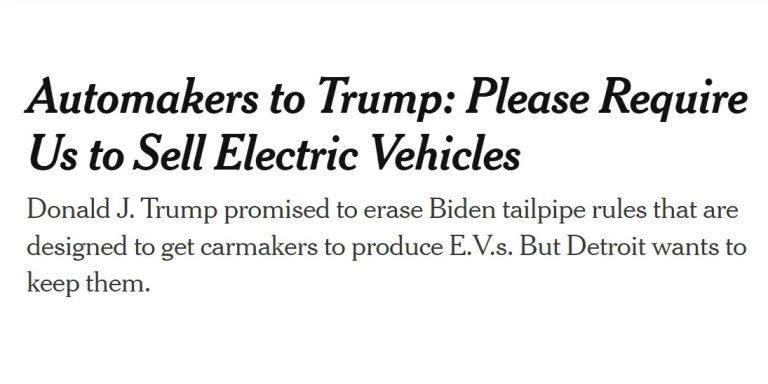In the ever-evolving automotive industry, listening to consumers has always been the cornerstone of sustainable success. In recent years, however, many automakers have turned a deaf ear to consumer preferences and bet heavily on electric vehicles (EVs), despite clear signals that the market is not yet ready to fully embrace EVs. The result? It was a multi-billion dollar disaster, and the companies are still banking on government intervention to undo their mistakes.
Money quotes say it all
A recent New York Times article underscores this point perfectly:
“But they have invested billions of dollars in the transition to electric vehicles and worry that if Mr. Trump makes sudden changes as he has promised, they could be undercut by automakers selling cheaper gasoline-powered vehicles.”
This admission is shocking. Automakers are investing heavily in electric vehicle production, putting politically charged visions of the future ahead of actual consumer demand. Now, they worry that a rollback of the EV mandate could leave them vulnerable to competition from companies insisting on making affordable gasoline-powered cars. This concern is justified because these companies choose to ignore basic market principles: Satisfy your customers, or others will too.
A tale of two strategies
While some automakers are making desperate bets on an electric future, others like Toyota are taking a more cautious approach. Toyota has long been a leader in hybrid technology, balancing innovation with consumer accessibility. Rather than forcing people to quickly switch to electric vehicles, Toyota is focusing on making cars that people want and can afford. The result? A loyal customer base and financial stability that does not rely on government bailouts or regulations to support its strategy.
Contrast this with companies that rush into electric vehicle production without fully considering demand. They are saddled with huge sunk costs — investments in EV production lines, supply chains and infrastructure — that they can’t recoup now. These companies are essentially betting on government policy to shape the market in their favor, a dangerous and unsustainable strategy.
Tesla: The Brilliant Exception
Amid this turmoil, Tesla has emerged as a shining example of how to succeed in the electric vehicle market without relying on government mandates or subsidies. Sure, Tesla has taken advantage of subsidies in the past because leaving money on the table is research, but unlike traditional automakers, Tesla is focused on making cars that people like Want to buy. Its design, technology and competitive performance attract consumers worldwide.
Elon Musk has been vocal about Tesla's ability to thrive without government support, recently saying subsidies or mandates were unnecessary for the company's success. Tesla achieves profitability and dominance by creating desirable products, not by cornering consumers through regulation. That's in stark contrast to traditional automakers, which appear more concerned with appeasing policymakers than satisfying customers.
Consumer disconnect
Many consumers remain hesitant to adopt electric vehicles due to high costs, range anxiety and insufficient charging infrastructure. Instead of addressing these issues, many automakers are doubling down on electric vehicle production and relying on regulatory mandates to artificially create demand for their products.
This approach ignores a simple fact: consumers vote with their wallets. Tesla understands this dynamic. Companies like Toyota continue to offer efficient and affordable options, demonstrating the importance of meeting consumer needs. On the other hand, those who bet on EVs without a clear understanding of the market can now only hope that government policy does not expose their poor decisions.
role of government
For major automakers now focused on electric vehicles, government intervention has become a lifeline. Subsidies, tax incentives and regulatory requirements are critical to making electric vehicles more competitive. Without them, these companies risk being priced out and outperformed by competitors offering cheaper alternatives to natural gas. However, relying on government policy to determine market dynamics is a dangerous game. As the New York Times article points out, policy can change with each election cycle, leaving automakers vulnerable to sudden changes.
Lessons for the future
Tesla's success and Toyota's solid strategy highlight an important lesson: Automakers must tailor their strategies to consumer demand, not political agendas. Innovation is important, but it must adapt to market realities. Companies like Tesla have shown that they can lead the way in electric vehicle adoption by providing products that customers want. Likewise, Toyota has proven that slow and steady wins the race by focusing on what people need today while preparing for the future.
At the same time, traditional automakers face huge risks as they incur huge sunk costs in the production of electric vehicles. No amount of government intervention can completely insulate them from the consequences of neglecting their customers.
Ultimately, the market will determine the winners and losers. Automakers that prioritize consumer satisfaction over government market manipulation will thrive, while those that bet on an uncertain future may find themselves struggling to survive. Tesla's trajectory proves that it's possible to innovate without compromise, and the rest of the industry would be wise to take notes.
Relevant
